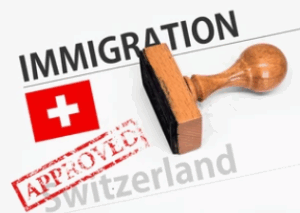LEGITIMATION CARD AND CI PERMIT
For officials from all over the world
The legitimation card (carte de légitimation) or CDL, is an authorization to work delivered by the Department of Foreign Affairs (DFAE) to foreign citizens employed by UN organizations, diplomatic missions, international and intergovernmental organizations as well as international conferences and Courts in Switzerland (art. 11 OLEH). CDL holders are allowed to travel in the Schengen area for a period of 3 months.

The Carte de légitimation
This authorization allows the beneficiary to exercise his duties without a visa or work permit in Switzerland. Thus, CDL holders are not regulated by the law on Foreigners and Integration (LEI). The DFAE or Federal Department of Foreign Affairs is in charge of the delivery and restitution of these authorizations through the Swiss Mission.
Different categories of CDLs exist depending on the holder’s position within the organization. Each family member travelling with the main applicant receives the same type of authorization.
An important aspect lies in the fact that holders of a B or C permit who are already living in Switzerland at the time of their employment with a UN organization or intergovernmental organization must return their current permit to cantonal authorities as they are required to hold a CDL during their functions. They can request their permit back once they have terminated their functions.
The period spent in Switzerland with a CDL is accounted for if the holder is retiring in Switzerland at the end of his functions and for a naturalization procedure.
Termination of a CDL permit
Different types of situations can lead to the termination of a CDL:
First, once the primary CDL holder has terminated his work assignment in Switzerland, authorizations are cancelled after a short courtesy period (two months) allowing the CDL holder to organise their stay in Switzerland, or their departure. Dependents are not allowed to stay in the country once the main applicant has terminated his functions in Switzerland, as they also lose their CDLs.
A six-month courtesy period can sometimes be requested to the Swiss Mission when children are in the middle of their school year. During this extended courtesy period, employment is not allowed and Ci permits are not valid anymore.

Children who reach their 25th birthday are no longer entitled to benefit from a CDL. In most cases, they must leave the country or apply for a B permit allowing them to live in Switzerland. Some exceptions apply for children who are enrolled at university or another higher education institution. In this case, they may apply for a student permit before their CDL expires.
Lastly, if a CDL holder applies for and receives an L, B or C permit, the CDL will be immediately terminated and immunity privileges will not apply anymore.
Divorcing under a CDL
If you are married to a CDL holder and are in the process of divorcing, you are allowed to maintain your CDL or Ci permit until the end of the divorce procedure. The main applicant’s employer must notify the Swiss Mission of the change of status. The employer provides the Swiss Mission with the new address of the separated spouse and children.
Once the divorce is pronounced, the employer must notify the Swiss Mission and retrieve the spouse’s and children’s CDLs. A courtesy period of two months must be requested in writing to the Swiss Mission to allow the spouse and dependents to prepare their departure.
If you are planning to stay in Switzerland after the divorce, you must apply for your own B permit according to the regulations of the law on Foreigners and Integration (LEI). A minimum of three years of marriage in Switzerland is required by authorities to apply for your own permit (art. 50 LEI)
The Ci Permit
The CDL holder is allowed to travel with his spouse and children under the age of 25 during his duties in Switzerland. Consequently, family members are equally granted a CDL, allowing them to reside lawfully in the country at the same address as the main applicant (art. 22 OLEH).
If the dependents wish to work in Switzerland, a Ci permit should be requested to replace the CDL. In this case, it is the Office Cantonal de la Population et des Migrations (OCPM) for the canton of Geneva who is responsible for delivering these permits in the canton.
A work contract signed by both parties is required to apply for the Ci permit.
The Ci permit functions the same way as a Swiss work permit, allowing the holder to work full-time without any restrictions in the canton. Ci permit holders are not subject to the restrictions applicable to non-European workers such as job market priority processes and quotas. Ci permits can be delivered for employed or self-employed activities for a maximum period of 2 years, renewable.
Pathways to a C permit
Access to C permit
At the time of retirement, a CDL holder over 55 years old who has lived in Switzerland for at least five years before retiring is allowed to apply for a B permit, or even C permit straight away, under specific conditions. A courtesy period of three months must be requested by the organization employing the applicant before the end of the contract, in order to leave the CDL holder enough time to apply. Proof of sufficient funds to cover living costs and good integration in the commune of residence must be demonstrated. A good level of French or German is also mandatory. It is up to the SEM in Bern to grant the C permit or not to the CDL holder and their spouse.
Children over 21 years old with 12 consecutive years of residency in Switzerland from the date they received a CDL can request a C permit if they live separately from the family and are well integrated in Switzerland, depending on the SEM’s appreciation (Chapter 7.2.6.2 Directives LEI p. 164).
Access to naturalization
Under the current law on naturalisation (LN), access to naturalization is challenging for CLD holders. This is due to a change in the law having occured in 2018, following which all applicants must hold a C permit to be eligible for citizenship (art. 9 al. 1 let. a LN).
Work permit applications in Switzerland, how to?
- How to apply for a work permit?
- How does it work if you’re not an EU-27 citizen?
- What are the conditions for obtaining a work permit for non-EU citizens ?
- Is there an unlimited number of EU work permit ?
More free content on Permits in Switzerland
Browse our free content topics below. Answers to important and frequently asked questions can be found here.
Moving abroad temporarily and thinking of maintaining your Swiss C permit?
A C permit is Switzerland’s permanent residency, allowing unrestricted work and residence nationwide. It is typically granted after 10 years of residency or 5 years...
Read MoreBusiness visitors to Switzerland
If you are planning a short-term business trip to Switzerland, it is crucial to understand and comply with the relevant immigration regulations. The Schengen...
Read MoreUK citizens planning to move to Switzerland: the 7 things you need to know to apply for a work permit
UK citizens planning to move to Switzerland: the 7 things you need to know to apply for a work permit From January 2021, UK citizens...
Read MoreSwiss residency and housing: Permit and rental insights
Switzerland is a country where Alpine serenity meets economic dynamism! With its world-class infrastructure, political stability, and exceptional quality of life, it is no surprise...
Read MoreMoving to Valais as an expat? The 10 golden rules you need to know
Valais canton offers an incredible work-life balance with a choice of international schools of high teaching quality and dynamic expat communities. Integration is the key...
Read MoreFlash News: New UK Travel Rules for Swiss & EU Citizens from April 2025
As of April 2, 2025, all Swiss and EU citizens, including children and babies, must obtain an Electronic Travel Authorization (ETA) to enter the UK...
Read MoreAre you holding a carte de légitimation or Ci permit and are planning to apply for a Swiss permit ?
Are you holding a carte de légitimation or Ci permit ? What is a CDL? The “carte de légitimation”, or Cdl, is an authorization to...
Read MoreSwiss naturalization: what are the 5 conditions to be eligible?
Swiss naturalization: obtaining Swiss citizenship is often perceived as the holy grail by foreigners, as the ordinary procedure is said to be one of the...
Read MoreUK citizens and the protection of acquired rights, what are the rules ?
Since the end of the post-Brexit transition measures in January 2021, UK citizens no longer hold the same residency rights as EU citizens. However, UK...
Read MoreAre you dreaming of working in the Swiss Alps this winter ? Check out the requirements for the seasonnal L work permit!
Switzerland is a prime destination for seasonal workers, especially during the winter months. Given the short duration of their stay, typically four to six months,...
Read MoreObtaining the Swiss citizenship
What changes under the new law? In June 2014, the Swiss Parliament modified the law regarding the conditions to obtain the Swiss citizenship. This change...
Read MoreWhat is happening in 2017 with Swiss work permit quotas?
The quotas for work permits attributed to non-European citizens in 2017 have been now established by the Federal Council. Bern decided that Switzerland must be...
Read MoreBook your consultation
Book your legal consultation online with English-speaking lawyers! We are located within the law firm OA Legal on the 5th floor at 1 place de Longemalle, 1204 Geneva. Our consultation can be made on Zoom or in our Office for a flat fee of CHF 300.-..










